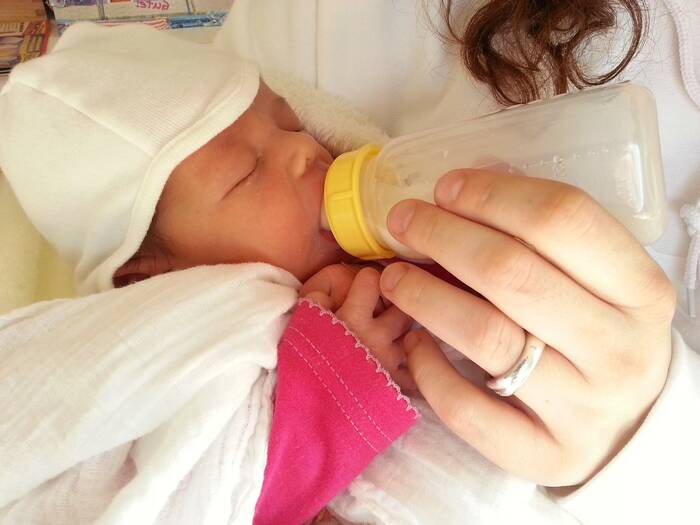How do you dry up breast milk quickly with parsley? Does parsley dry up breast milk? How to use parsley to stop milk flow in the bra with parsley? Cataplasm? Or herbal tea? And what are the other natural remedies to stop breast engorgement?
What are the methods to skip breast milk drying? Can I Drink Parsley Water while Breastfeeding? How long It take for milk to dry up? What Food Stop Breast Milk Production? What can cause breastmilk to dry up? How long for hormones to balance after weaning? How to have breast milk without getting pregnant? And finally, will my baby get sick when I stop breastfeeding?
I- Why Stop Breastfeeding?
About 30% of French babies are never breastfed, even though breastfeeding is widely recommended by the World Health Organization.
Mothers who choose not to breastfeed their child with natural milk must stop the milk coming in naturally 2 to 4 days after giving birth.
It is important to remember that the fact that the baby is not put to the breast immediately after birth does not prevent the milk from coming in.
It delays the arrival and the quantity of milk but does not prevent it.
The breasts swell, harden, and are very painful if nothing is done. This is why it is essential to stop the flow of milk.
It is therefore advisable for the mother who does not want to or cannot breastfeed her baby to inform the midwife immediately.
The midwife will apply one of the existing means to stop the milk coming in, namely a traditional means or the administration of a specific medication.
II- How Do You Dry Up Breast Milk Quickly with Parsley?
1. Does Parsley Dry Up Breast Milk?
In general, for women who are not breastfeeding, parsley leaves are used against breast engorgement.
Specifically, they promote the drainage of the mammary gland.
They not only help to reduce breast engorgement but also to cure it.
2. How to Make a Cataplasm of Parsley?
To make a parsley poultice, you must first chop very finely 1 large bunch of flat or curly parsley.
Then, spread the chopped parsley in the middle of sterile gauze and fold the edges. Finally, with the help of a bandage, maintain the poultice on the area to be treated.
You can also proceed as follows: mix a bunch of fresh parsley with cumin and spread the resulting mixture on a compress and place it on the breast.
If necessary, do the same on the second breast and hold it with a not too tight bandage.
3. Parsley Omelet to Reduce Breastfeeding and Dry up Breast Milk
For 2 people, you need to gather the following ingredients: 4 eggs, parsley, butter, salt, and pepper.
First, in a bowl, break the eggs and beat them into an omelet, then chop the parsley. Then, sprinkle a little parsley over the beaten eggs and add salt and pepper to taste. Then, melt a little butter in a frying pan and pour the eggs in.
A third time, it is advised to let cook then turn over to cook the other face.
You can roll the omelet for a more pleasant presentation. Serve preferably with salad.
4. Parsley Tea to Dry Up Breast Milk
You can also make a parsley tea that will help you stop the milk from rising. Simply pour 1 tablespoon of dried parsley leaves into a cup of boiling water.
Infuse for 5 minutes, then strain. For a three-week course of treatment, it is recommended that you drink 2 to 4 cups per day.
III- Other Natural Remedies to Dry Up Breast Milk
1. Peppermint Essential Oil To Dry Up Breast Milk
First of all, it should be noted that peppermint essential oil helps stop lactation. Specifically, it not only helps to relieve congestion in the breasts but also facilitates the cessation of milk production fairly quickly.
It is strongly recommended that you stop breastfeeding your baby before using this oil because it is very toxic for babies, and pregnant women, and their fetuses.
You must pour a maximum of two drops of peppermint essential oil on a lump of cane sugar, and let it melt directly under your tongue. Do this 3 times a day.
2. Cabbage Leaves to Dry Up Breast Milk
Some scientific studies have been carried out on the effectiveness of cabbage in stopping milk flow. It should be noted, however, that the studies are mostly small.
In addition, the data collected is limited because of the engorgement that often resolves naturally after a few days. For all these reasons, these results should be taken with caution.
For women who choose to use cabbage to stop milk flow, the Canadian Breastfeeding Foundation advises, first, to rinse the leaves well with cold water.
Next, it recommends rolling them with a rolling pin to soften them. Finally, the foundation asks that they place the cabbage leaves in a bag in the refrigerator for one hour, or in the freezer for 15 minutes.
3. Hypnosis to Dry Up Breast Milk
Women who decide not to breastfeed their child with milk very often lose confidence in themselves. This is manifested for example by stress and many other dysfunctions.
Hypnosis allows them to revisit their perception of their reality and thus reduce certain symptoms.
Hypnosis is used to develop the self-confidence of women who decide not to breastfeed their children.
This would not only develop their ability to be a mother but also their body. In short, hypnosis allows them to be appeased and it is in this way that it participates in the stopping of the rise of milk.
4. Herbal teas (Mint, Sage, Jasmine) to Dry Up Breast Milk
Herbal teas are made with mint, except if homeopathy, sage, and a tea or jasmine tea are not only analogous but also stop lactation.
It is recommended to take 1 to 2 drops morning, noon, and night on a cube of sugar or a spoon of honey. If it is local, take 1 drop on the chest morning and evening or 3 drops if diluted.
5. Acupuncture to Dry Up Breast Milk
Acupuncture is used to effectively treat several breastfeeding difficulties: increasing milk production (even during breast reduction), treating mastitis and breast abscesses, encouraging the milk to flow, for example, following a cesarean section, and reducing engorgement.
It is also used to stop the flow of milk.

IV- Methods to Skip for Breast Milk Drying
There are several methods that women have used to dry up the breast milk that comes out of their mother’s breasts. Some have been proven to work and others carry risks that are not worth taking. Here are just a few:
1. Medication
The human body is so fragile that it is best to avoid ingesting drugs or chemicals, which are usually very harmful in the long term.
As there are other, simpler methods to stop producing breast milk, then it would be better to use them before thinking of any chemical medication, which always carries a health risk.
2. Binding
This is a method that has sometimes been used to dry breast milk.
It turned out that the risk balance is much more important than the result obtained.
By squeezing their breasts, a little harder, women risk obstructing the mammary ducts and causing mastitis.
3. Take Birth Control
Like the case of drugs, birth control pills (estrogen) are contraindicated to stop producing breast milk.
It is indeed a fairly effective method with which we have results in just a few weeks, but it also carries risks for the health of mothers who are still fragile after giving birth.
So remember that in case of an option for this method, ask before starting the advice of your doctor.
4. Pumping Milk from Breast
Another method to avoid the risks it can cause for breastfeeding women.
In addition, it is always accompanied by pain and stress.
V- Can I Drink Parsley Water while Breastfeeding
Parsley is known to be an excellent diuretic. There is no particular evidence or contraindication for not eating it raw or cooked, or taking it as tea.
As we have just seen, it is mainly used by new mothers who wish to stop producing breast milk.
But eating a parsley leaf now and then or even drinking parsley herbal tea will not affect breast milk production in any way.
It is especially to be avoided to take it in large quantities and for a fairly long period.
It will make your breasts dry up.
VI- What Food Stop Breast Milk Production
Sage, parsley, and peppermint are traditionally used to decrease milk production.
Sage and parsley are particularly recommended in case of overproduction of milk or to facilitate weaning.
Otherwise most natural and healthy foods are good for increasing breast milk production.
VII- What Can Cause Breastmilk to Dry Up
sucking the breast by the baby is one of the most important factors in stimulating the production of breast milk.
Thus the number of feeds greatly influences the quantity of milk produced by the breasts. This is why your baby needs to breastfeed well and often.
Nursing babies at night is important because it is during the night that a woman’s body produces more prolactin, the hormone that stimulates breast milk production.
Here are some other causes that can negatively affect breast milk production:
- Taking certain drugs such as contraceptives Surgery on the breasts
- Lack of rich and balanced diet
- Hormonal imbalance
- Separation of the mother and her baby for several reasons such as returning to work.
- Stress and anxiety.
- Other diseases
VIII- How Long It Takes for Milk to Dry Up
There is no definite time for drying up maternal milk after stopping breastfeeding.
Each woman has her physiology and particular living conditions.
But we can say that the drying up is done in just a few weeks. And that is why it is necessary to take all these natural elements that have just been discussed above, to accelerate the drying up of the breasts.
IX- How Long for Hormones to Balance After Weaning
Here too, the return to the natural balance of hormones in the normal state before pregnancy depends on the physiology of women and their lifestyle.
But usually, this return to normal hormones occurs between 6 to 9 weeks.
Note that stopping breastfeeding can be accompanied in some women by anxiety attacks, stress, and rarely pain in the breasts.
X- How to have Breast Milk Without Getting Pregnant
There is no particular interest in a woman who has not had a baby to have breast milk produced. Except in the case of the death of a mother (a relative) who has just given birth or the adoption of a newborn for whom we want to give natural milk.
The only known way is to stimulate the breast until it can give milk.
This natural stimulation can be done by simply breastfeeding the baby or using a gadget to express milk from the breast.
And concerning women, who see their breasts producing milk without giving birth and without any particular stimulation, various reasons can be the cause.
Among these causes we can cite:
- Significant hormonal imbalance
- Taking medication
- A breast tumor (which is very rare)
- Significant stimulation during intimate acts.
XI- Will my Baby Get Sick When I Stop Breastfeeding
The answer is yes.
Weaning can sometimes have negative effects on the baby, as well as the mother.
In addition, babies who have already breastfed may refuse to take the bottle, which can cause weight loss, significant stress manifested by constant crying, and becoming ill.
The risk of infection increases when you stop breastfeeding babies because their body, which does not yet produce antibodies, takes them from breast milk.
